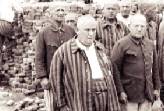
This photograph shows roll-call of Jewish prisoners (wearing Star of David badges) on 20 July, 1938 at Dachau concentration camp.
Dachau was a Nazi concentration camp which opened on March 22, 1933, initially intended to hold political prisoners. It is located on the grounds of an abandoned munitions factory northeast of the medieval town of Dachau. After its opening by Heinrich Himmler, its purpose was enlarged to include forced labor, and, eventually, the imprisonment of Jews, Romani, German and Austrian criminals, and, finally, foreign nationals from countries that Germany occupied or invaded. The Dachau camp system grew to include nearly 100 sub-camps, which were mostly work camps or Arbeitskommandos, and were located throughout southern Germany and Austria. The main camp was liberated by U.S. forces on April 29, 1945.
Prisoners lived in constant fear of brutal treatment and terror detention including standing cells, floggings, the so-called tree or pole hanging, and standing at attention for extremely long periods. There were 32,000 documented deaths at the camp, and thousands that are undocumented. Approximately 10,000 of the 30,000 prisoners were sick at the time of liberation.
In the postwar years, the Dachau facility served to hold SS soldiers awaiting trial. After 1948, it held ethnic Germans who had been expelled from eastern Europe and were awaiting resettlement, and also was used for a time as a United States military base during the occupation. It was finally closed in 1960.
Dachau was a Nazi concentration camp which opened on March 22, 1933, initially intended to hold political prisoners. It is located on the grounds of an abandoned munitions factory northeast of the medieval town of Dachau. After its opening by Heinrich Himmler, its purpose was enlarged to include forced labor, and, eventually, the imprisonment of Jews, Romani, German and Austrian criminals, and, finally, foreign nationals from countries that Germany occupied or invaded. The Dachau camp system grew to include nearly 100 sub-camps, which were mostly work camps or Arbeitskommandos, and were located throughout southern Germany and Austria. The main camp was liberated by U.S. forces on April 29, 1945.
Prisoners lived in constant fear of brutal treatment and terror detention including standing cells, floggings, the so-called tree or pole hanging, and standing at attention for extremely long periods. There were 32,000 documented deaths at the camp, and thousands that are undocumented. Approximately 10,000 of the 30,000 prisoners were sick at the time of liberation.
In the postwar years, the Dachau facility served to hold SS soldiers awaiting trial. After 1948, it held ethnic Germans who had been expelled from eastern Europe and were awaiting resettlement, and also was used for a time as a United States military base during the occupation. It was finally closed in 1960.

